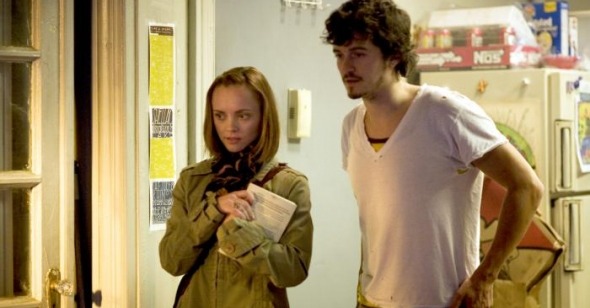Shitty Symphony
By Justin Stewart
New York, I Love You
Various directors, U.S., Vivendi Entertainment
New York, I Love You follows 2006's Paris, je t'aime as the second entry in a city tribute series created by Emmanuel Benbihy, who is producing along with Crash's Marina Grasic. Collective works with multiple directors, the films will next blow kisses to Rio de Janeiro, Shanghai, Jerusalem, and Mumbai. My humble admonition to Benbihy and Grasic: IT'S NOT TOO LATE TO STOP. A whimsical idea in theory—and a throwback to omnibus films like RoGoPaG (1962) and 1965's delightful Paris vu par…—the results so far indicate that the project's already off the rails.
Excepting a painfully dead-on short by Alexander Payne, the Paris film was a mostly wince-inducing collection with particularly ghastly entries from Wes Craven (with Payne as Oscar Wilde's ghost!?) and Christopher Doyle. It could be dismissed as a one-off curio had it not paved the way for the more thorough disaster that is New York, I Love You, a movie that will test any professed NYC lover's affection. The producers reject the term "anthology movie" for this project, because there's actor and crew overlap, and some of the shorts are sliced up and sprinkled throughout intermittently. There were also "rules" for each filmmaker (only two days to shoot, a recognizable neighborhood, a required love encounter of some sort) that fuse the pieces, but the most unifying factor is their badness.
Deciding which short is the worst can provide its own kind of fun, as an email thread with a friend proved, but it's hard not to single out Brett Ratner's garish tale of virginity lost. Climaxing in a repugnantly staged scene of sex between a teen boy and a wheelchair-bound girl hanging from a tree branch, Ratner's "film" ends up soiling by proxy both its location (Central Park) and distinguished costar (James Caan, as a blundering pharmacist). Like most of the entries, Ratner's ends with a "twist" meant to delight and cast what preceded it in a new light. Here, it turns out Olivia Thirlby's character isn't really handicapped, just an actress. This ridiculous turn of events, like most, is more offensive and vexing than fun. I was so accustomed to having the rug pulled, in fact, that when I got to Joshua Marston's short about Eli Wallach and Cloris Leachman doddering around Brighton Beach, I half expected a bus to slam into Wallach as he slowly crossed a street.
Hayden Christensen and Orlando Bloom are particularly inauthentic as street-savvy modern bohemians in segments by Jiang Wen and Shunji Iwai, respectively. Christensen dons a funky hat as a pickpocket who is smugly outfoxed by Andy Garcia, while Bloom strains for slovenliness in a dirty t-shirt and scruff as an animation soundtracker. Bloom's musician's only contact with the outside world is with a director's assistant who gives him quirky assignments, like reading Dostoyevsky novels. Towards the end, he hears a knock on the door—it's the assistant. Slowly lowering a copy of Crime and Punishment from in front of her face, she is revealed to be… Christina Ricci—the same kind of anticlimactic "surprise reveal" found in several other segments ("Oh my God, that's Chris Cooper!").
The most somber piece of the bunch, Shekhar Kapur's ghost story might also be the most laughable and interminable. A half-asleep (but still “glamorous”) Julie Christie mopes around her hotel, and shares a glass of champagne with a limping Shia LaBeouf, who might not really be there. Then John Hurt shows up. Allen Hughes directs what I’ll call Bradley Cooper and Drea De Matteo's Infinite Playlist, in which two strangers struggle (via voiceover) with their uncertain desire to follow up on a previous one night stand. The actors have little to do other than gaze pensively out of subway and cab windows, but at least Michael McDonough's cinematography has appealingly sleek, New York-at-dusk romantic warmth. DP Benoit Debie brings the same look to New York, I Love You's only other decent segment, a tête-à-tête between pickup artist Ethan Hawke (loquacious and Before Sunset-y) and a mysterious lady of the night, Maggie Q.
Why is it so bad? For one, the restrictive rules might have gotten the movie made in eight weeks (no doubt on the cheap), but they also standardized the tone and ambitions. Prioritizing "unification”—trying to make it more like Crash than New York Stories—over ensuring quality individual segments resulted in a permeating low grade. A roster of directors not typically associated with the city shows global-thinking good intentions. The "outsiders' perspectives" (though none of the segments are about tourists, per se), all feel the same, typified in Natalie Portman's mawkish entry about a black male nanny—a manny—insulted by white women even though he's later revealed to be the child’s father, and more importantly, a wonderful dancer. The hand of producers Benbihy and Grasic is too heavy, so what could have been a fun hodgepodge is a repetitive stream of twists, fumbled romances, missed connections, and the perennial search for real human bonding in this crazy/beautiful city we call New York. (Yuck.)
